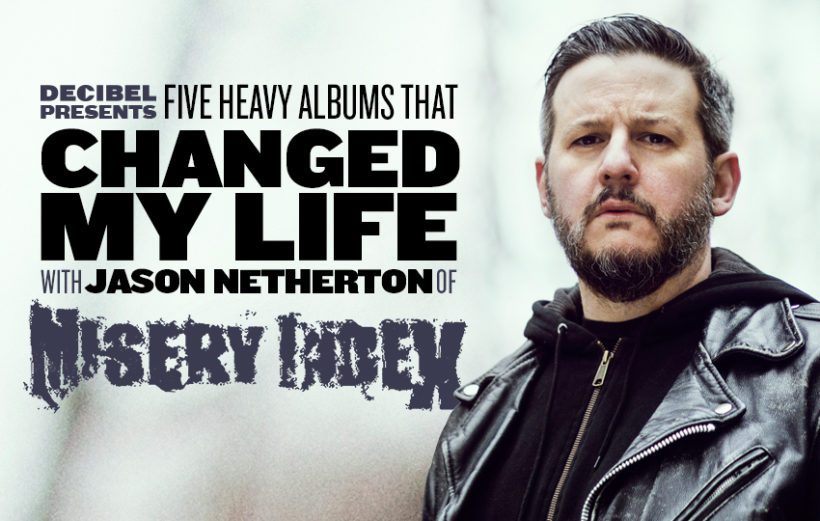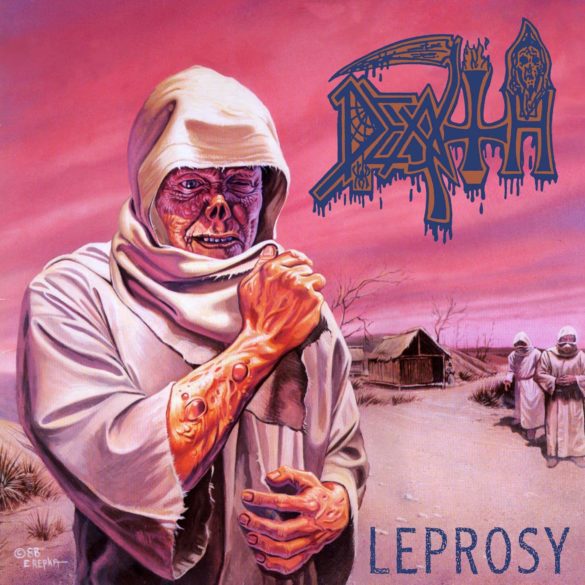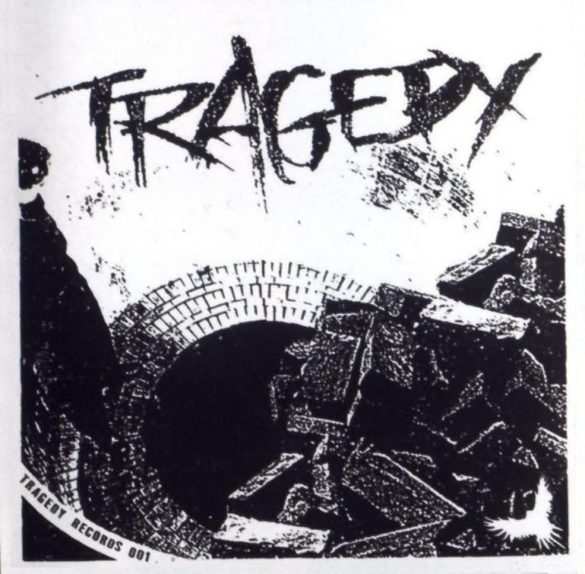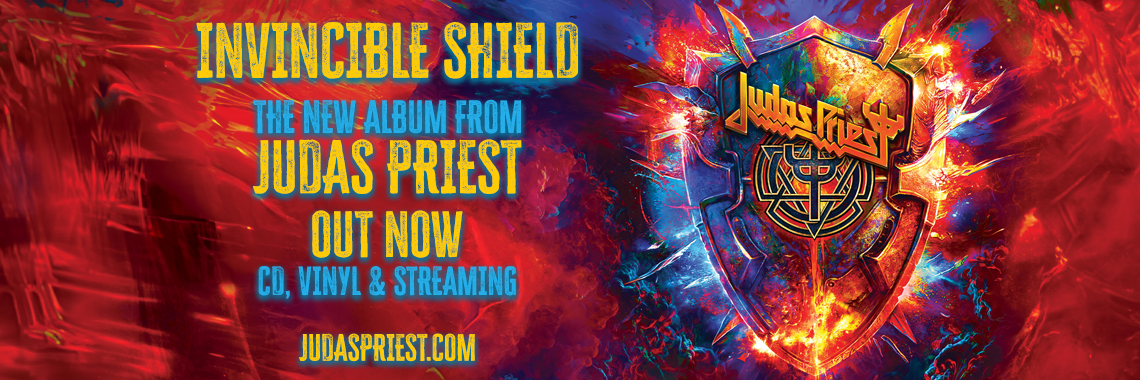
Baltimore death/grinders Misery Index are about to drop their sixth full-length, Rituals of Power, a massive monolith of death metal might and grindcore intensity. To celebrate the release of the record, we caught up with vocalist/bassist Jason Netherton to find out what five heavy albums changed his life. From legendary DM releases to a crust classic with a detour off to progressive hardcore, Netherton’s tastes are all over the map and, if we may editorialize, spot-on.
Check out our review of Rituals of Power here, and read on to see what albums shaped Netherton’s views of heavy music.

Iron Maiden – Somewhere in Time (1986)
Of course the idea of what is “heavy music” is subjective and/or relative, which also makes it difficult to whittle a whole lifetime’s worth of “heavy” influences down to just five albums. However, I will begin with Iron Maiden’s Somewhere in Time, which marks my first “heavy” watershed moment. It was a time when my 14-year-old self at last turned away from the prevailing MTV metal-lite of Dokken and Mötley Crüe to begin that long quest (also taken by many others) toward increasingly “heavier” and more extreme frontiers. Somewhere in Time was the gateway drug, one which I bought because of the video for “Wasted Years” (as seen on MTV!). I then immediately took a liking to the “heavier” songs on the album (e.g. “Sea of Madness”) and those more up-tempo (“Deja-Vu”). It was the spark that led to weekend trips to record stores all over the Washington, DC area seeking out not only Iron Maiden’s back catalog (Piece of Mind is my all-time favorite) and other more obvious entries (Metallica, etc.), but also more obscure (now favorite) albums from the likes of Holy Terror, Fates Warning, Voivod, Coroner and Sabbat.

Death – Leprosy (1988)
Death’s Leprosy was the second watershed moment in my historical annals of heavy-tude. Notably, I heard Scream Bloody Gore the previous year after a friend bought it, and although I liked the hook of “Regurgitated Guts,” I just could not get past the vocals. I was not quite sure if it was supposed to be a humorous thing; I recall laughing out loud because it just seemed so ridiculous. But with Leprosy, it was like, “Okay, I am starting to get this now”… The songs were better, the eerie melodies were even more present and it was simply, undeniably, the heaviest thing I ever heard. It was the album that began my lifelong affinity for all that is death metal. I can say it all started with this album, and although there are certainly “heavier” albums that came after (like, for example, the absurdly over-the-top heaviness of Suffocation’s Effigy of the Forgotten), it was still Leprosy that first showed me that death metal had arrived, that it was to be taken seriously, and that the creative door was wide open.

Carcass – Symphonies of Sickness (1989)
After Death, there were a number of other albums that carried the torch of all that is sublimely heavy and sacred; Obituary’s Slowly We Rot and the first Deicide album were the next ones that came on the horizon. However, it was when I heard Carcass’ Symphonies of Sickness that things really opened up into a new dimension. It pried open this “seventh seal” of sorts and opened a portal into an entirely new world. “Heavy” became something more extreme, forbidden and transgressive; imagine hearing blast beats for the first time, staring at that collage of gore on the cover and hearing that high/low dual-vocal attack along with a cacophony of odd melodies and weird song structures. On top of that, the drums doing who-knew-what, with it all dripping in filthy analog glory from your speakers? A few months later I saw them open for Death in DC, and seeing blast beats performed live for the first time was mind-blowing and life-changing. Fast forward a month or two, and the Earache/Combat Grindcrusher compilation made its way to the tape deck; from then on the demons were out, the dam was broken and the speakers in my 1987 Nissan truck were utterly destroyed.

Snapcase – Progression Through Unlearning (1997)
Later, in the 1990s, death metal started to get weird; some bands broke up, some released terrible albums, some kept the flag flying just doing exactly the same thing. At this point, I was firmly entrenched in the “death metal underground,” well-aligned with the brutal death metal contingent (think Internal Bleeding, Pyrexia, Mortal Decay, and so on) which was pushing boundaries by finding new ways to make heavy even heavier. This is also when I noticed what was happening in hardcore, where things were taking on more metallic characteristics and developing its own interpretation of “heavy.” I was already intrigued by the likes of Integrity, Madball and even more locally, Next Step Up; however, the one album that really grabbed me from this scene was Progression Through Unlearning from Snapcase; to me, it upended my frontier of what “pissed off” music was supposed to sound like; it was coming from a different world than I was used to, and perhaps that is why it resonated with me more strongly. It was the “right album at the right time” kind of thing, but it also opened the door to new ways of songwriting, and, in turn, even how one might even “make” death metal from a different perspective.

Tragedy – Tragedy (2000)
In the early 2000s there was another watershed moment. This time it was Tragedy, the new band from ex-His Hero Is Gone members. In 2002, I picked up their self-titled, self-released debut album on a whim from a distro at a show in Baltimore. Never heard of them, but just thought it looked interesting. The drive home was revelatory; I still remember listening to it and being blown away by the vicious, raw anger, the melodies and the end-of-the civilization ominousness of it all. It was sheer nihilistic bliss; “heavy” as the weight of the world, with an overbearing melancholy and darkness that seemed to be creeping over from another dimension. It opened up the door to a lot of cool music that was happening then in hardcore punk, like other albums from Wolfpack, From Ashes Rise and so on. If anything, it shows that the subjective/relativeness of “heavy” is something which is constantly recalibrating and reconfiguring as one goes through life. What lies ahead, then? “Where next to conquer” in the “perpetual conversion” of all that is deemed and re-deemed “heavy”? The next watershed is just around the corner…






